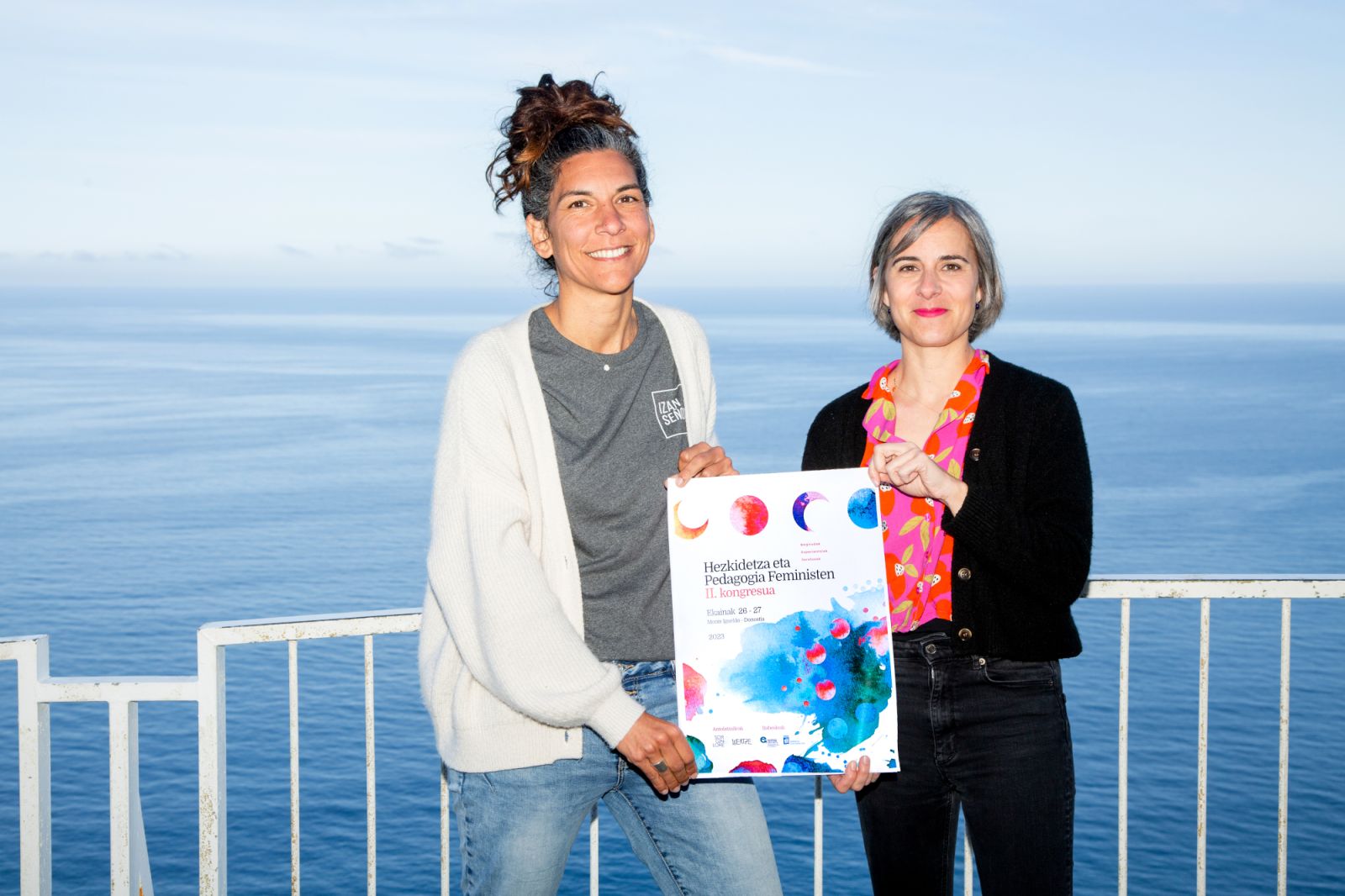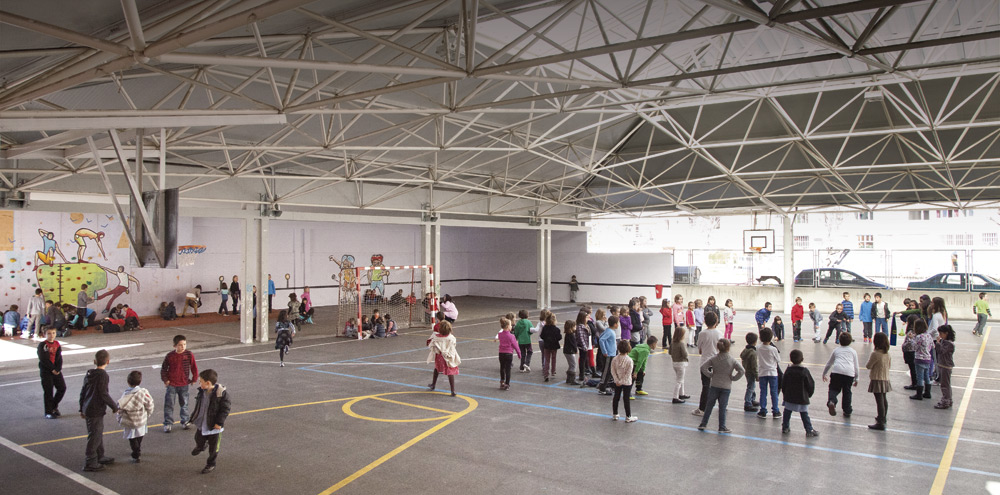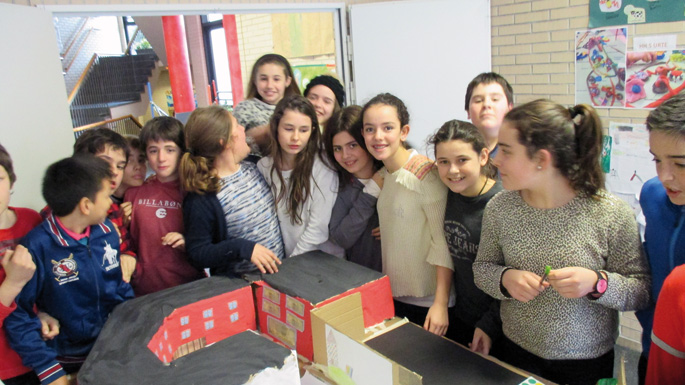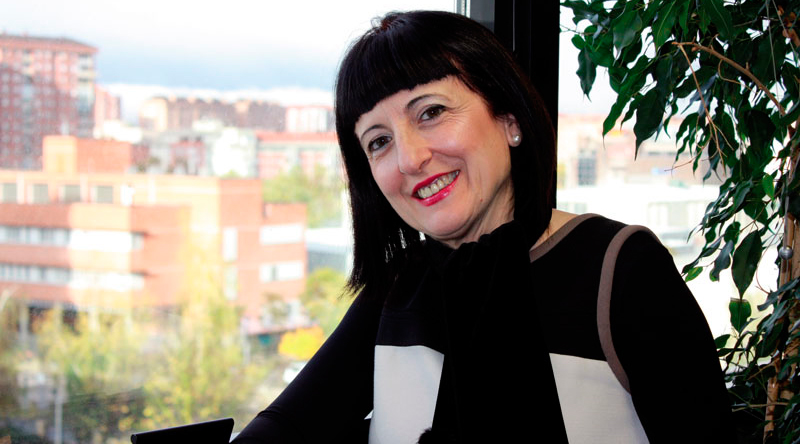Two days to expand views and enjoy
- On 26-27 June it will be held at the elegant Igeldo hotel. Feminist Coeducation and Pedagogy Day. With the sea in view and dedicating all the time from morning to afternoon with the same crew, they will dive into the subject. Euskera will have priority in Congress and in Spanish and there will be a translation service into the sign language. Come? Registration is open.

Each day will start with a strong talk: the first day the Andalusian attorney Pastora Filigrana will focus the issue of intersectionality from the point of view of the feminist anti-capitalist gypsy; and the second day the feminist pedagogue Mireia Delgado will offer the keys for heteronorma to exploit pleasure.
After the main presentations, each participant will have to choose the format in which they want to work: the round tables will allow sharing reflections, experimenting and transferring the topic to the body through workshops, and in the experience section will be able to acquire practical knowledge and positive examples in progress.
We met with Maider Sagredo and Leire de Miguel Martínez, from the organization team, to learn more about the substance of the congress.
What needs does this congress come from?
Leire de Miguel Martínez: Thanks to the work carried out by feminism, steps are being taken in co-education, the need to work on the theme in the centers is seen and work is being done on it... but in that work there are not only achievements, but also deficiencies and challenges.
Maider Sagredo: The fourteen agents that we're working on in this field have come together to organize this congress, and the nature and daily lives of each are very different. We start from the needs of each of them to choose the topics to be discussed in the congress.
L. de Miguel Martínez: Yes, we start from the experience of each one in daily life and we have removed a lot of issues from the gaps and concerns that each one sees. But we've realized that basically these issues are in touch.
M. Sagredo: We prioritize intersectionality, non-interity, pleasure and body. These four axes will be present in all the topics to be discussed. And on the other hand, in the days we have tried to combine both approaches: on the one hand, reality is raw and we have a responsibility for it, and on the other hand, it is important to make known and enjoy the small steps that are taken.
Four main blocks or themes have been selected. The first, “Comprehensive gender education”. What is missing for comprehensive gender education?
M. Sagredo: Widening the point of view of erotic, self-knowledge, abandoning sex education based on penetration... Schools are making a way to work these approaches, but on many occasions within special lessons or learnings, that is, when biology works, we continue to learn what we always have.
L. de Miguel Martínez: In the erotic traditionally there have been some things in the center and the intention is to expand that vision. We came from a very coitocentrist education. Breaking that down is understanding that the work of challenges and emotions is also gender education.
M. Sagredo: And that sex education also includes stereotypes, roles, power... At the round table “Marginal erotic”, Eider Goiburu will talk about the pedagogy that is done in schools, Mentxu Arrieta made theater about functional and erotic diversity and will talk about its reality and Elena/Urko works pornography in education and from there will make contributions.
The second central theme is “Violence(s) and healthy relationships.” Plural violence(s).
M. Sagredo: Yes, or in street language, what? This open question is in the air and we're going to look for answers. Therefore, to respond responsibly, the round table will be composed of men*: Josetxu Riviere, member of Aranda Gizonduz, will provide data to situate the issue; he will share the conclusions of Hiruki Larrox in the process of feminist elaboration of young boys; and Miguel Angel Arconada, as a professor, how to face these situations, what roles exist, occupation of space, attention…
The workshop, aimed at women*, will focus on the use of tools of brotherhood and feminist self-defense.
And in the section on experiences, we will focus on gordobia, because within the topic of violence the “blackophobia” has appeared strongly, which is often not addressed from the co-educational point of view and we saw it necessary.
L. de Miguel Martínez: Yes, it seems to us that it is a matter to be paid attention, because that is where many violence arises.
M. Sagredo: It is also a normalized violence and is not identified as violence.

The third topic is “Public Co-education”. Because co-education is not just a school issue.
L. de Miguel Martínez: Education is not only taught in schools, so what would be the objective? Let our peoples be co-educational.
M. Sagredo: It is the responsibility of all the people and we want to give strength to small local initiatives, because if it does not seem that “everything or nothing” we fall into that. Every small initiative also goes towards a co-educational village. To make these experiences visible, he will participate in a round table explaining the experience that the Hernani City Hall is carrying out in neighborhood care, 12 clouds will explain the project that is underway in the El Pilar neighborhood of Vitoria-Gasteiz for the empowerment of young people through community surveillance and the conclusions of the research being carried out by Marina Sagastizabal and Robotiker-Yus.
L. de Miguel Martínez: The workshop will be dynamized by the Juntura cooperative and with it we intend to expand the meaning of the word “vigilance”. It will work the force of the use of space, as it must turn the way of designing the spaces of the people so that surveillance is on the axis.
The last topic is the “Map of co-education”, which will have a different format, as it will be organized in “txokos of penetration”.
M. Sagredo: We will create ten thematic corners, because the people involved also have great knowledge and we want to give them a space to create synergies and get to know each other and penetrate. We see it on a day-to-day basis, maybe a school makes an awesome piece of material, and there it is, and the next school starts from scratch. To share these materials there is a very powerful Online structure available to everyone, but it is not used.
L. de Miguel Martínez: We highlight three words in the congress: looks, experiences and redactions. The first congress was held in 2020 and the pandemic did so online and the issue of penetration was insufficient. So when we started working at the second congress, it was clear that we wanted to give it the time and space for it. The afternoon of the second day will be devoted to it.
M. Sagredo: It is a space in which theory and practice converge so that people exchange what has worked and what has not...
The different artistic methodologies to be used in the workshops section attract attention.
L. de Miguel Martínez: In daily experience we see that both young people and adults know politically that we are all correct. But it's not that easy to make changes out of there. On the contrary, if we take the work to the body and experience it, from that experience it advances more easily. Artistic methodologies help us do that. We approached the theater Xanti Agirrezabala, Artaziak contemporary art, Oriana de Imaginá artistic therapy...
You have also given rise to spontaneous creativity.
M. Sagredo: The round tables will provide visual summaries reflecting the most important ideas by drawing. Conclusions will also be drawn from bertsos Saioa Alkaiza and Maddi Ane Txoperena, conclusions rap Oskar Estanga and clownclusions Beatriz Egizabal. All of them will help to share and have moments of pleasure so that whoever has been on a subject can pick up what has been worked on other issues.
Congress emerged from the collaboration of 14 agents
The second conference was organized among fourteen agents: the promoter group has proposed the themes and decisions have been taken in the advisory group. Maider Sagredo explained that “when it comes to creating a group of consultants, we have tried to involve different agents, such as associations working on the subject, public institution officials, and experts: some of the first conference rapporteurs have been involved in decision-making in the advisory team. As in the consulting team we are very different agents, it has been nice to see that the names that were strong references for some were unknown to others. There has been great diversity in referents.”
The congress is organized by Sorginlore, Ikertze, Emagin, Arremanitz, Imaginá de la Costa Rica, Alboan, the City of San Sebastian (Cooperation, Youth, Education and Equality), Biltzen, Hiruki Larroxa, Tabakalera - Artaziak de Educación, Team of UPVHU.
They sponsor the Basque Development Cooperation Agency and the City Hall of San Sebastian.
Irailetik aurrera, eta hala eskatzen duten ikastetxeetan, genero berdintasunari buruzko ikasgaia izango dute 12-14 urteko ikasleek Galizian. Astean ordubeteko iraupena izango du eta erabaki aitzindaria da Espainiako Estatuan.
aukeratzeko gidak Lekeition
Gabonak datozela eta ipuin eta jostailu ez sexistak aukeratzeko gidak argitaratu ditu Lekeitioko Udalak. Hainbat liburu eta jostailuren bidez genero estereotipoak transmititzen dira. Baina berdintasunean oinarrituriko baloreak zabaltzeko material ugari dago, horietako asko... [+]
Eusko Jaurlaritzako Hezkuntza sailak hezkidetza lantzeko eta eraso sexistei aurre egiteko plana jarriko du martxan EAEko ikasgeletan. Besteak beste, “genero eta gizarte eraldaketa” ikasgaia bultzatuko du.


















